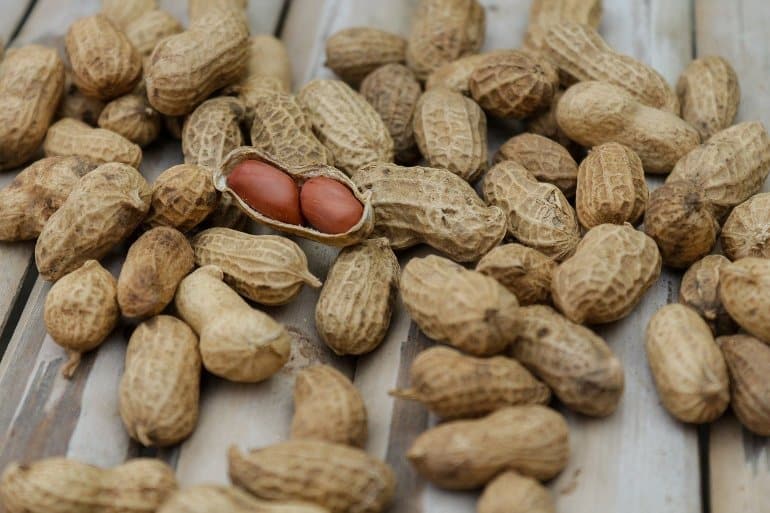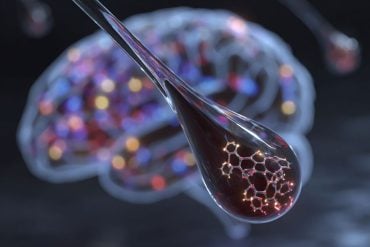Summary: A new study reports cancer patients who frequently eat peanuts may be at increased risk of their cancer spreading. Researchers found Peanut agglutinin (PNA), a carbohydrate-binding protein that enters blood circulation after a peanut is eaten, interacts with endothelial cells to produce cytokines. Some of the cytokines are recognized promoters of cancer metastasis.
Source: University of Liverpool
A study by University of Liverpool researchers has identified new factors accompanying previous findings that frequent consumption of peanuts by cancer patients could increase risk of cancer spread.
The study, published in Carcinogenesis, shows that Peanut agglutinin (PNA) — a carbohydrate-binding protein that rapidly enters into the blood circulation after peanuts are eaten — interacts with blood vascular wall (endothelial) cells to produce molecules called cytokines.
The cytokines in question, IL-6 and MCP-1 are well-known promoters of cancer metastasis. The increased cytokine production causes other endothelial cells to express more cell surface adhesion molecules, making them more attractive to the circulating tumour cells and thus potentially promoting metastasis.
In an earlier study, Corresponding Author Professor Lu-Gang Yu and colleagues reported that circulating PNA binds to a special sugar chain, which occurs mainly on pre-cancerous and cancer cells, and interacts with a larger protein expressed on the surface of tumour cells in the bloodstream.
This interaction triggers changes in the larger protein, resulting in underlying adhesion molecules on the surface of the cancer cell to become exposed, making the cancer cells stickier and easier to attach themselves to the blood vessels. It also allows the cancer cells to form small clumps that prolong the survival of cancer cells in the body’s circulation. Many epithelial cancers spread to the other organs through traveling through the bloodstream.

Professor Lugang Yu said: “Although further research and investigation are still needed, these studies suggest that very frequent consumption of peanuts by cancer patients might increase the risk of metastatic spread.
“Reassuringly though, a large US study reported no significant impact of peanut consumption on cancer mortality. In another study, peanut consumption was reported to have no significant effect on prognosis in men with established prostate cancer. In our previous healthy volunteer study, substantial blood concentrations of PNA were only seen transiently one hour or so after consumption of a large dose (250g) of peanuts, so it may be that ‘normal’ peanut consumption yielding lower PNA concentrations is harmless.
“Nevertheless, the possibility remains that circulating PNA, at least at the relatively high levels found shortly after a large “dose” of peanuts, could have a significant biological effect on tumour cells circulating at that time, with a potential for increased risk of metastasis. Heavy or very frequent peanut consumption therefore might be better avoided by cancer patients.”
The possible impact of heavy peanut consumption by cancer patients on survival will need to be investigated in further population-based epidemiological studies.
Funding: This study was supported by the American Institute for Cancer Research.
About this cancer research news
Source: University of Liverpool
Contact: Press Office – University of Liverpool
Image: The image is in the public domain
Original Research: Closed access.
“Appearance of peanut agglutinin in the blood circulation after peanut ingestion promotes endothelial secretion of metastasis-promoting cytokines” by Weikun Wang, Paulina Sindrewicz-Goral, Chen Chen, Carrie A Duckworth, David Mark Pritchard, Jonathan M Rhodes, Lu-Gang Yu. Carcinogenesis
Abstract
Appearance of peanut agglutinin in the blood circulation after peanut ingestion promotes endothelial secretion of metastasis-promoting cytokines
Peanut agglutinin (PNA) is a carbohydrate-binding protein in peanuts that accounts for ~0.15% peanut weight. PNA is highly resistant to cooking and digestion and is rapidly detectable in the blood after peanut consumption.
Our previous studies have shown that circulating PNA mimics the actions of endogenous galactoside-binding protein galectin-3 by interaction with tumour cell-associated MUC1 and promotes circulating tumour cell metastatic spreading.
The present study shows that circulating PNA interacts with micro- as well as macro-vascular endothelial cells and induces endothelial secretion of cytokines MCP-1 (CCL2) and IL-6 in vitro and in vivo.
The increased secretion of these cytokines autocrinely/paracrinely enhances the expression of endothelial cell surface adhesion molecules including integrins, VCAM and selectin, leading to increased tumour cell-endothelial adhesion and endothelial tubule formation.
Binding of PNA to endothelial surface MCAM (CD146), via N-linked glycans, and subsequent activation of PI3K-AKT-PREAS40 signalling is here shown responsible for PNA-induced secretion of MCP-1 and IL-6 by vascular endothelium.
Thus, in addition to its influence on promoting tumour cell spreading by interaction with tumour cell-associated MUC1, circulating PNA might also influence metastasis by enhancing the secretion of metastasis-promoting MCP-1 and IL-6 from the vascular endothelium.







